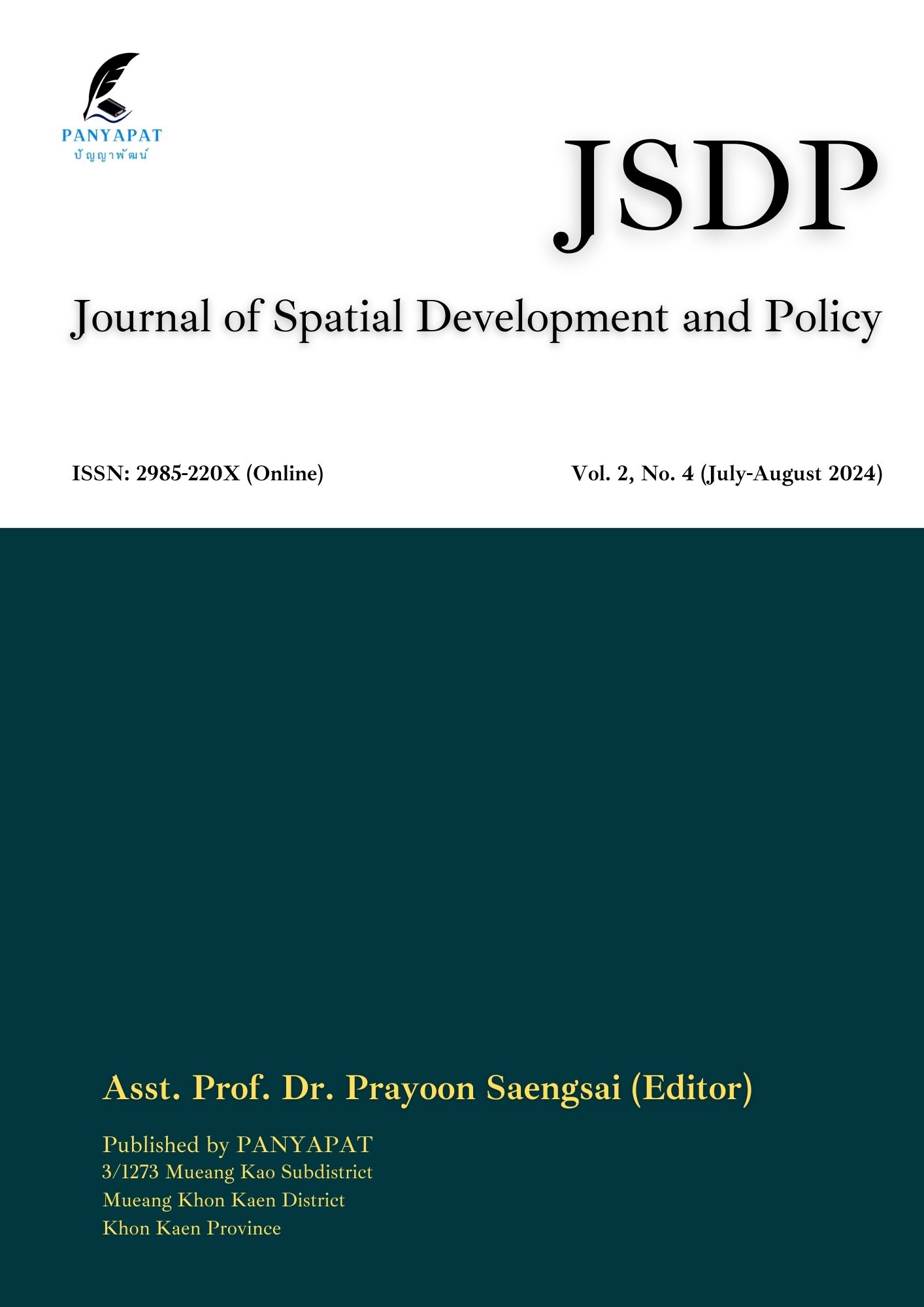Managing the Grassroots Economy Towards the Center of the Mekong River Basin in the Upper Northeastern Region
Main Article Content
Abstract
This research aims to study (1) the management of the grassroots economy towards the center of the Mekong River Basin, (2) the factors affecting the management of the grassroots economy towards the center of the Mekong River Basin, and (3) the management approach of the grassroots economy towards the center of the Mekong River Basin in the upper northeastern region. This study is mixed-method research. The instruments used to collect data include questionnaires and interviews. The statistics used for data analysis include means, standard deviations, multiple regression analysis, and descriptive analysis. The results of the study found that the management of the local economy in the Mekong River Basin is at a moderate level overall, ranked from most to least as follows: cooperation, In terms of volunteer behavior and promotion and development, respectively. Factors affecting the management of the grassroots economy to the center of the Mekong River Basin, including human resource development (X4), information technology (X3), and management (X1), with coefficients of predictors in the raw scores (b) equal to .425, .278, and .044, respectively. The management guidelines for the grassroots economy to the center of the Mekong River Basin found that (1) there should be after-sales service, (2) there should be buildings or groups of buildings that develop mixed-use areas and shopping malls, (3) products sold in shopping malls should be modern, (4) there should be the introduction of technology that takes into account the impact on the environment systematically, (5) create public participation, public relations for trade that investors come to develop the city throughout the development, focusing on supporting tourism in the management of trade, investment, and tourism effectively.
Article Details

This work is licensed under a Creative Commons Attribution-NonCommercial-NoDerivatives 4.0 International License.
References
กรมการพัฒนาชุมชน กระทรวงมหาดไทย. (2560). แนวทางการดำเนินงานนโยบายสานพลังประชารัฐในการขับเคลื่อนการพัฒนาเศรษฐกิจฐานรากและประชารัฐ. กรุงเทพฯ: กรมการพัฒนาชุมชน กระทรวงมหาดไทย.
กัลยา วานิชย์บัญชา. (2560). การวิเคราะห์สถิติ : สถิติเพื่อการตัดสินใจ. (พิมพ์ครั้งที่ 12). กรุงเทพฯ: โรงพิมพ์แห่งจุฬาลงกรณ์วิทยาลัย.
โครงการศึกษาวิจัยพลวัต. (2564). Supply Chain ในอนุภูมิภาคลุ่มน้ำโขงและนัยต่อการพัฒนาโครงสร้างพื้นฐาน. บริษัท ทรานส์คอนซัลท์ จำกัด.
ทวีป บุตรโพธิ์. (2560). การขับเคลื่อนเศรษฐกิจฐานรากและประชารัฐ. กรุงเทพฯ: วิทยาลัยป้องกันราชอาณาจักร.
บุหงา ชัยสุวรรณ, พรพรรณ ประจักษ์เนตร และ กิรติ คเชนทวา. (2562). ปัจจัยพยากรณ์ความสำเร็จในการส่งเสริมการพัฒนาเศรษฐกิจฐานรากในชุมชน: กรณีศึกษาจังหวัดชายแดนภาคเหนือ ภาคตะวันออกเฉียงเหนือ และภาคใต้. วารสารวิชาการมนุษยศาสตร์และสังคมศาสตร์ มหาวิทยาลัยบูรพา, 27(53), 87–108.
ปัณณวิชญ์ แสงหล้า, พระมหาสมมาส ชุติมนฺโต (พงษ์สุพรรณ), สหพร แสงวันดี และ ประสิทธิ์ แสงทับ. (2565). การพัฒนาองค์ความรู้เศรษฐกิจฐานรากของชุมชนเพื่อความยั่งยืนในศตวรรษที่ 21. วารสารมหาจุฬาวิชาการ, 9(3), 290–303.
พิทยา บวรวัฒนา. (2556). รัฐประศาสนศาสตร์ ทฤษฎีและแนวคิดการศึกษา (ค.ศ.1887-ค.ศ.1970). กรุงเทพฯ: จุฬาลงกรณ์มหาวิทยาลัย.
วันเพ็ญ ศรีแก้ว. (2552). การพัฒนาศักยภาพในการปฏิบัติงานของเจ้าหน้าที่ส่งเสริมการเกษตร ในจังหวัดเชียงใหม่. (วิทยาศาสตรมหาบัณฑิต, มหาวิทยาลัยเชียงใหม่).
ศิริวรรณ เสรีรัตน์. (2552). การบริหารการตลาดยุคใหม่. กรุงเทพฯ: บริษัท ธรรมสาร จำกัด.
สมเกียรติ สุทธินรากร. (2562). การพัฒนาโมเดลนวัตกรรมการบริหารจัดการที่ส่งผลต่อการสร้างสรรค์มูลค่าของผลิตภัณฑ์วิสาหกิจชุมชน. (ปรัชญาดุษฎีบัณฑิต, มหาวิทยาลัยศิลปากร).
Armstrong, G., Adam, S., Denize, S., & Kotler, P. (2014). Principles of marketing. Victoria: Pearson Australia.
Herkema, S. (2003). A Complex Adaptive Perspective on Learning with in Innovation. Projects. The Learning Organization, 10(6), 340-346.
Lemon, M., & Sahota, P. S. (2004). Organizational culture as a knowledge repository for increased innovative capacity. Technovation, 24(6), 483-498.
Yamane, T. (1973). Statistics: an Introductory Analysis. (3rd ed.). New York: Harper and Row.

